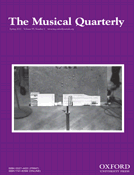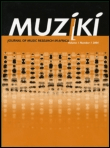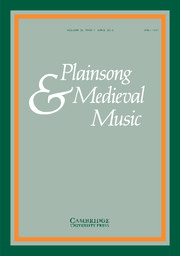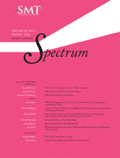
Musicologist
Scope & Guideline
Elevating Music Research to New Heights
Introduction
Aims and Scopes
- Cultural and Contextual Musicology:
The journal emphasizes the study of music within specific cultural and historical contexts, highlighting regional practices and their evolution over time. - Interdisciplinary Research:
It promotes interdisciplinary methodologies that incorporate elements from anthropology, sociology, and history to enrich the understanding of musical practices. - Exploration of Contemporary Trends:
The journal features research on contemporary music scenes, examining how modern influences and discourses reshape traditional practices and genres. - Ethnomusicological Perspectives:
'Musicologist' prioritizes ethnomusicology, focusing on field recordings, community practices, and the lived experiences of musicians. - Innovations in Music Theory and Practice:
The journal also investigates theoretical advancements and innovative practices in music composition, performance, and technology.
Trending and Emerging
- Contemporary Music Practices:
Research on contemporary music scenes, particularly within specific cultural contexts such as Turkey and Taiwan, is gaining traction, reflecting a broader interest in modern musical expressions. - Interdisciplinary Approaches:
There is an increasing trend towards interdisciplinary studies that combine musicology with other fields, such as sociology and cultural studies, to address complex musical phenomena. - Technological Innovations in Music:
Emerging studies on the impact of technology on music creation and performance, including microtonal instruments and electroacoustic compositions, suggest a growing interest in how technology reshapes musical practices. - Sonic Emotions and Social Issues:
The exploration of the relationship between music, emotions, and social issues, such as racism and cultural identity, is becoming more prominent, indicating a shift towards socially engaged musicology.
Declining or Waning
- Historical Musicology:
There has been a noticeable reduction in papers focusing solely on historical musicology, indicating a shift towards contemporary and applied music studies. - Traditional Music Forms:
Research centered on traditional music forms appears to be less frequent, possibly due to the increasing interest in contemporary and hybrid musical practices. - Western Classical Music Analysis:
Analysis of Western classical music seems to be waning, as the journal increasingly favors studies on non-Western music traditions and contemporary genres.
Similar Journals

Musicology Today
Exploring the Soundscape of ScholarshipMusicology Today, published by SCIENDO, is a pivotal journal in the field of musicology, presenting a platform for scholars, researchers, and practitioners to disseminate their findings and engage with current trends in music research. With its ISSN 1734-1663 and E-ISSN 2353-5733, the journal aims to provide a comprehensive overview of various aspects of music, including theory, history, and ethnomusicology, fostering a multidisciplinary dialogue among its contributors. Located in Warsaw, Mazovia, Poland, this journal is not only committed to high academic standards but also to promoting open access to knowledge, thereby enhancing accessibility for a global audience. As it continues to bolster its reputation in the academic community, Musicology Today plays an essential role in shaping the future of music scholarship and invites the engagement of seasoned researchers and emerging voices alike.

Revista de Musicologia
Empowering Music Scholars with Original ResearchRevista de Musicologia is a distinguished academic journal dedicated to the exploration and analysis of musicology, published by the SOC ESPANOLA MUSICOLOGIA. Based in Spain, this journal serves as a vital platform for music scholars, researchers, and enthusiasts to share innovative insights and original research concerning various aspects of music, including historical studies, ethnomusicology, and contemporary critiques. With its ISSN 0210-1459 and a current Scopus ranking placing it in the Q3 quartile of Music studies, the journal reflects a commitment to enhancing the discourse in this rich field. Although it currently does not publish under an open-access model, it continuously aims to provide a rigorous peer-reviewed environment for contributions that engage both academic inquiry and practical applications within musicology. The Revista de Musicologia is thus an essential resource for anyone in the field looking to expand their understanding and expertise in music studies from 2016 through 2024 and beyond.

MUSICAL QUARTERLY
Unveiling the Depths of Musical KnowledgeMUSICAL QUARTERLY, published by Oxford University Press Inc, is a distinguished journal in the field of music, with a publication history that stretches back to 1915. This esteemed journal, identifiable by its ISSN 0027-4631 and E-ISSN 1741-8399, provides a critical platform for scholarly discourse, analysis, and research in musicology and related disciplines, facilitating an understanding of both historical and contemporary musical practices. Although it operates without open access, it continues to attract a diverse readership of researchers, educators, and students alike, thanks to its well-curated articles and reviews that engage with music theory, history, and ethnomusicology. With a current Scopus rank of #119 out of 180 in the Arts and Humanities category and a 34th percentile ranking in Music, MUSICAL QUARTERLY plays a vital role in advancing knowledge and fostering collaboration within the music academic community. Its commitment to high-quality scholarship is reflected in its ongoing efforts to address the evolving landscape of music studies, making it an essential resource for anyone serious about exploring the rich tapestry of music scholarship.

Muziki-Journal of Music Research in Africa
Illuminating the Intersections of Music and Society in AfricaMuziki - Journal of Music Research in Africa is a leading publication dedicated to exploring the rich tapestry of music research across the African continent. Published by Routledge Journals, Taylor & Francis Ltd, this journal has been at the forefront of scholarly discourse since its inception in 2004, providing a platform for innovative and interdisciplinary approaches to the study of music. With an ISSN of 1812-5980 and E-ISSN of 1753-593X, it ensures wide accessibility to both print and digital audiences. As of 2023, it holds a prestigious Q3 ranking in the field of Music, reflecting its commitment to quality scholarship and the promotion of diverse musical narratives. Muziki is particularly invaluable for researchers, professionals, and students seeking to deepen their understanding of African musicology and its socio-cultural relevance. The journal publishes original research articles, reviews, and critical essays, highlighting contemporary developments and historical contexts in music research. With a Scopus rank of 59/180 in the Arts and Humanities Music category, it stands as a respected source for advancing knowledge and fostering dialogue within the global music community.

RIVISTA ITALIANA DI MUSICOLOGIA
Connecting Scholars Through the Language of MusicRIVISTA ITALIANA DI MUSICOLOGIA, published by the Italian Society of Musicology, is a distinguished journal dedicated to the field of musicology, offering a platform for scholarly research and discourse on a wide array of musical topics. With an ISSN of 0035-6867 and an E-ISSN of 2036-5586, this journal has contributed significantly to the understanding of music in cultural and historical contexts. Although the scope of coverage was marked from 2003 to 2008 in renowned databases like Scopus, the journal continues to serve as an invaluable resource for researchers, educators, and students embroiled in music studies. Its emphasis on rigorous research and critical analysis makes it a vital asset for anyone seeking to deepen their knowledge of musicological inquiry. While not an open-access publication, the RIVISTA ITALIANA DI MUSICOLOGIA remains a prestigious outlet for scholarly contributions that reach audiences eager to explore the complexities of musical heritage.

Plainsong & Medieval Music
Celebrating the Legacy of Plainsong and Medieval SoundsPlainsong & Medieval Music is a prestigious journal dedicated to the study of early music, particularly plainsong and its cultural contexts, published by Cambridge University Press. Established in 1992, this journal has become a vital resource for scholars in the field of musicology, offering a platform for the dissemination of high-quality research. With an impressive Q1 ranking in the Music category for 2023, it is recognized for its significant contribution to the academic discourse surrounding medieval music traditions. While the journal does not currently offer Open Access options, its rich content, ranging from peer-reviewed articles to critical reviews, remains accessible to researchers, professionals, and students eager to deepen their understanding of this nuanced area. Residing in Cambridge, England, the journal continues to embrace innovative research methodologies, ensuring it remains at the forefront of the evolving landscape of music studies.

MUSIC THEORY SPECTRUM
Redefining Boundaries in Music Theory ResearchMUSIC THEORY SPECTRUM, published by Oxford University Press, serves as a premier journal in the field of music theory, recognized for its significant contributions and scholarship since its inception. With an ISSN of 0195-6167 and E-ISSN 1533-8339, this journal has established a distinguished position within the academic community, boasting an impressive Q1 status in the Music category for 2023 and ranking #17 out of 180 in Scopus for Arts and Humanities, Music, placing it within the 90th percentile. Despite its non-open access format, MUSIC THEORY SPECTRUM offers a wealth of research articles, reviews, and theoretical discussions aimed at both seasoned scholars and students alike. It spans from 1981 until present, fostering critical engagement and advancing understanding within the discipline. Researchers and music theorists will find this journal an invaluable resource for the latest insights and methodologies in music theory.

Problemy Muzykalnoi Nauki-Music Scholarship
Unveiling the Richness of Musical ResearchWelcome to Problemy Muzykalnoi Nauki-Music Scholarship, a leading journal in the field of music scholarship published by the esteemed Gnesin Russian Academy of Music. With an ISSN of 2782-358X and an E-ISSN of 2782-3598, this Open Access journal has been committed to the dissemination of high-quality research since 2009, making scholarly work accessible to a global audience. Covering diverse aspects of music theory, history, and its socio-cultural impacts, Problemy Muzykalnoi Nauki serves as an essential platform for scholars, educators, and practitioners in the arts and humanities, as well as in social sciences related to music education. While its Scopus coverage was discontinued in 2021, the journal remains influential, holding a rank of #48 in the Arts and Humanities category and a percentile of 67th, showcasing its relevance and rigor in the discipline. We invite researchers and students alike to explore the rich contributions made within these pages, fostering a deeper understanding and appreciation of music in contemporary society.

MUSIK UND KIRCHE
Fostering Dialogue on Music's Role in Ecclesiastical LifeMUSIK UND KIRCHE is a distinguished journal published by BARENREITER-VERLAG that offers a scholarly platform for the exploration of the intersections between music and ecclesiastical contexts. With an ISSN of 0027-4771 and an E-ISSN of 2568-3128, this journal is particularly valuable for researchers, practitioners, and students engaged in musicology, religious studies, and cultural history. Although currently not open access, it provides a wealth of peer-reviewed articles that enhance understanding of music's role within church tradition and practice, thereby contributing significantly to the field. Despite fluctuating visibility in academic rankings—standing in Q4 of the 2023 category for Music, based on Scopus evaluations—its historical coverage from 2002 to 2012 and resumed publication since 2020 demonstrates its commitment to fostering rigorous academic discourse. The journal is based in Kassel, Germany, and serves as an essential resource for anyone interested in the dynamic relationship between music and spiritual life.

Musica Hodie
Unveiling the Rich Tapestry of Music ResearchMusica Hodie is a pivotal academic journal published by the Universidade Federal de Goiás, Brazil, focusing on the field of music. The journal, with ISSN 1676-3939 and E-ISSN 2317-6776, serves as a vital platform for scholars, professionals, and students to disseminate innovative research findings and critical analyses related to music theory, history, and practice. With a prestigious Q2 ranking in the Music category and a Scopus rank of 103/180, the journal significantly contributes to the cultural and academic landscape of music studies in Brazil and beyond, covering converged years from 2010 to 2016 and also from 2018 to 2023. Although it operates under a subscription model, the journal remains committed to fostering open dialogue and knowledge sharing in the arts and humanities. As researchers delve into the intricacies of music, Musica Hodie stands out as a key resource for advancing scholarly discourse and enhancing the understanding of music’s multifaceted role in society.